In early 2012 I started following a strict bodybuilding diet, which involves eating seven times a day, and obsessively measuring out every meal to meet a predetermined ratio of fat, protein, and carbohydrates.
To commit to this food plan, I usually have to pack my meals in tupperware and bring them with me to parties and other social outings. This means I’m often caught scarfing chicken between conversations, and pulling out my food scale at awkward places. Although I try to be discreet, I usually end up having to explain my obsessive behavior to those around me.
The question I get asked most often is “Why are you doing this?”. My standard response used to be “To look like Arnold“, but I’ve been asked this question enough times where I’ve since given it some serious thought.
It first started with a health checkup in early 2011. Since I have a habit of working out regularly, and generally stay away from junk food, I was surprised when my doctor told me I had high cholesterol. My total cholesterol was at 226, where ideal is 150-200, and my LDL cholesterol was at 153, where the ideal is less than 130. “But the good news is”, my doctor assured me, “you’re only 25. People don’t normally get heart attacks until they’re 60.”
January, 2011
Around the time when I got my cholesterol checked. I was in good shape, and worked out 3-5 times a week.
Now this is the part where I’m supposed to tell you I went home and immediately started my bodybuilding diet. But like most people who are aware of a health problem, I made no effort to change my habits.
That summer, I even traveled Europe for 5 months and ate all sorts of cochinillo, schweinshaxe, and foi gras, cholesterol be damned. By the end of the trip, I still managed to lose 15 lbs. I guess that’s what happens when you spend your days lounging in Parsian parks nibbling on macaroons instead of pumping iron. Looks like my ancestors gypped me on the cholesterol gene, but gave me some kind of freakish metabolism instead.
By the time I got back to the U.S., I was ready to get back in shape, so I did what I always do when I’m trying to bulk up – I started lifting weights 5 times a week, and eating a gratuitous amount of food in order to gain as much muscle as possible.
This method sounds terrible to me now, but in college it worked wonders. I could devour all sorts of cookies, steaks, and hamburgers, and still build muscle while remaining lean. But in my older age, it was clear that my method wasn’t working as well as it used to. Although I was building muscle, I was also starting to develop a gut. Yup, this was officially my first sign of aging. Goodbye youth…it was fun while it lasted!
July, 2011
I lost 15 lbs while traveling Europe. Here’s me in Germany, at 180 lbs.
March, 2012
Before I started the bodybuilding diet, I bulked back up to around 200 lbs, eating whatever I wanted.
So I turned to the internet for advice. Anyone who has ever tried searching for diet tips online will probably agree with me that it’s about as fun as filing your taxes. You have to trudge through hundreds of contradictory nutritional advice (milk is bad for you, milk is the perfect drink, avoid egg yolks, egg yolks are the best part), dodge gimmicky supplement ads (“Effortless six-pack abs in 2 weeks, or your money back!”), and decode vague health information like “Detox your body with a cabbage cleansing to restore your inner spiritual and emotional balance”. Huh?
I wasn’t looking for a flash diet or a quick fix. I wanted to do it the hard way. The way that works.
It turns out all the more credible sounding articles were bodybuilding related. Unlike articles marketed towards yoga girls and beach body types, bodybuilding articles tend to dive deeper into the biochemistry of food, and focus on the overall diet, rather than focusing on a specific “healthy food” [1]. I’m still waiting for the day a frozen yogurt cleanse becomes fashionable, triggering a new generation of yoga girls with uncontrollable gas.
The more I read about bodybuilding, the more there was to learn. I soon found myself reading all about the glycemic index, the role of B vitamins, the effects of omega-3 on jaw development, formulas for calculating basal metabolic rate, etc.
I picked up copies of books like Strength Training Anatomy, Protein Power, and Arnold Schwarzenegger’s The New Encyclopedia of Modern Bodybuilding, where I learned how to properly execute a back double biceps pose, and learned what a protein shake in the 1970s looked like. It was all fascinating to me.
My nightly entertainment quickly degenerated into watching meatheads on YouTube lift heavy objects while grunting loudly. I was so into my videos that one night my girlfriend had to subtly suggest we watch something less testosterone-charged, like The Notebook. We compromised and ended up watching Food, Inc.
Looking back, it’s kind of amusing that I became so fascinated with a hobby such as bodybuilding. Although I’ve lifted weights for years, I never thought I’d have anything in common with bodybuilder types. But actually its appeal (at least to me) has a lot in common with gaming and general nerd stuff. Watching your body change is like leveling up, and pre-packed meals are like health potions. Following a consistent diet plan allows me to do things like A/B test foods and their effectiveness. Tracking metrics like meal timing and proportions means I know exactly what day and time I will run out of chicken in my fridge. Bodybuilders are really just body hackers…nerds in giant meat suits. Okay maybe I’m stretching it a bit. But this is how I justify my quick downward spiral into meathead land.
What to Eat
One thing I noticed right off when doing my research is that all bodybuilders eat the same few foods. If you go over to bodybuilding.com and check out any professional bodybuilder’s profile, chances are they built their physique using chicken breast, brown rice, and broccoli. At first it was a weird concept to go from eating whatever I wanted to eating only 10 different kinds of foods. But actually in an industry filled with noise and drowning in misinformation, this stroke of clarity was what I needed to get started.
Here are the foods that all bodybuilders eat over and over:
Protein sources:
- 99% lean chicken / turkey
- Tilapia
- Egg whites
- Whey protein
- Salmon (this is both a protein and fat source)
Carb sources:
- Brown rice
- Sweet potatoes
- Oatmeal
- Ezekial bread
Fat sources:
- Almonds
- Avocados
- Fish oil
- Flaxseed oil
Vegetables:
- Broccoli
- Spinach
- Asparagus
- Kale
There are a thousand reasons why these few foods are popular among bodybuilders, so I’ll mostly summarize.
Protein
Chicken breast and tilapia are going to be your main sources of protein because they are lean, easy to cook, and not too expensive. You could also try turkey, halibut, or other lean fishes (sole fish, catfish, tuna, etc.), but I find that each have their respective disadvantages. Turkey, if not ground, can be very tough. Halibut is far more expensive than tilapia. Sole fish is generally very fishy, and flaky once cooked. Also since you’ll be mass producing this food, you’ll want something that will last at least a week in your fridge. Just from my anecdotal experience, chicken and tilapia pass the seven-day-old taste test better than other types of meat.
Whey protein (which is extracted from cow milk) will also be a staple. It’s popular among bodybuilders because it’s quickly absorbed by the body, making it perfect in a post-workout shake when the body is in an optimal state the utilize the protein. I also recommend having it in the morning as a breakfast shake if you’re too lazy to make eggs. Before bed, I recommend casein protein (thicker and slower absorbing, also extracted from cow milk).
Egg whites are also a great source of protein. It has the highest bioavailability of any protein source, which means the body can utilize more of it due to its balance of amino acids. As a comparison, beef is only 80% as bioavailable, and soybeans is 74% [2]. The main disadvantage of egg whites is that it naturally contains a lot of sodium. Since I don’t add salt to my food, I was surprised when I first calculated my sodium intake, which was on the high side due to egg whites.
For vegetarians, vegans, or those watching their cholesterol (fish, lean chicken, and whey protein all contain cholesterol!), I recommend Nutiva Organic Hemp Protein or Life’s Basics Plant Protein (the unsweetened version is better). Hemp protein (extracted from ground up hemp seeds) is amazing stuff – it’s a complete protein, it’s high in fiber, and it’s rich in Omega 3-6-9 essential fatty acids. At first when I did my research, I was set on finding a highly isolated plant-based protein, something like Manitoba Harvest Hemp Pro 70, where most of the calories would come from just protein. But the fiber and essential fats in hemp is part of what makes it so great, so I actually think the isolated versions take away many of its advantages. If you’re not a vegan, I recommend mixing the hemp protein with whey protein for better bioavailability (hemp is “complete” but still low on certain amino acids, like lysine). If you’re a vegan, I recommend just using Life’s Basics Plant Protein (the pea and brown rice protein fill in the gaps in hemp’s amino acid profile). I use hemp protein twice a day – once in the morning mixed in with whey, and again before bed, mixed in with casein.
Beef – I do not recommend eating beef or any kind of red meat. I love a 12 oz ribeye just as much as anyone else, but after looking up the nutrition facts I’ve concluded that you should only eat it on rare occasions, if ever. It has far more cholesterol and saturated fat than chicken or fish, and the visible fat is harder to isolate and remove. If you do eat beef, I recommend it be organic and grass-fed, which is leaner, lower in cholesterol, and higher in omega-3 than corn-fed beef. The same is true for salmon – if you have the budget for it, I recommend buying wild caught salmon, which contains more omega-3 and less cholesterol than farm-raised salmon. Here’s a pdf of the leanest cuts of beef.
Carbs
Controlling your carb intake is the most important factor in whether you gain muscle or lose fat. Usually the only difference between a gaining diet versus a cutting diet is the increased carb consumption. The best carb sources are whole grain, unprocessed, and high in fiber. Refined carb sources like white rice, pasta, and white bread are not optimal because they have a higher glycemic index (GI) and lower fiber content [3]. Most bodybuilders will eat low GI carbs throughout the day, the only exception being right after a workout, where you’ll want to eat a high GI carb (like bananas, candy, or fruit juice) combined with protein.
Brown rice is what I eat most often, because it’s easy to make in a rice cooker, it’s cheap, and you can keep dry rice in your pantry forever. The main disadvantage is it can taste dry and stale after a few days in the fridge, so I usually just make a batch once every two days.
Sweet potatoes are my favorite in terms of taste. It’s good right out of the oven, it’s good cold, and it’s also good after a week in the fridge. It can also be used as a dessert (try adding cinnamon and almond oil!). The main disadvantage is that it takes a long time to cook (I usually bake a batch at 400 degrees for 1 hour 30 minutes), and you have to peel the skin.
I eat a lot of oatmeal as well. Old-fashioned oatmeal is really convenient if you own a hot water dispenser, but my favorite is steel-cut oats. Old-fashioned oats are oats that have been cut, rolled flat, steamed, then lightly toasted. It’s more processed (and thus higher glycemic index) than steel-cut oats, which are just whole grain oats cut into pieces by a steel blade. Steel-cut oats take longer to cook (you can make it in your rice cooker), but has a better texture and taste.
If you’re not a brown rice, sweet potato, or oatmeal kind of person, you can always try Ezekiel bread, which is a low GI flour-less bread made from grains, legumes, and lentils. You can usually find it at stores like Trader Joe’s or Whole Foods, sometimes in the frozen foods section (it doesn’t store very long if you leave it out).
Fats
Almonds are probably the most popular fat source used by bodybuilders. It’s mostly comprised of monounsaturated and polyunsaturated fat (versus coconut or macadamia nuts, which contain a higher amount of saturated fat), and contains a high amount of fiber. I recommend eating either raw almonds, or unsweetened almond butter. You can also try making your own almond butter, which is a lot of fun – just grind a bunch of almonds in a food processor, and add a bit of vegetable oil (or almond oil!) to get it going. Almonds are probably my favorite fat source because it keeps forever, and I munch on them while I code.
I occasionally eat avocados to change it up, but there are many practical disadvantages. Avocados come in various sizes, so if you’re OCD about measuring out your food like me, you almost always leave part of an avocado in the fridge, which won’t be good the next day. And since they don’t last long in the fridge, especially once you cut it open, you can’t pre-pack it in tupperware the way you can with almonds. Recently I’ve been buying fresh guacamole from the store (make sure it only contains whole avocados and fresh vegetables, with no added oil or sugar) and using that instead of avocados. Easier to store and measure, and they taste great on eggs.
Omega-3 – Fresh salmon is my favorite source for this. I usually just bake it in the oven with lemon and pepper. You can also take fish oil pills if cooking fish isn’t your thing, although I generally recommend you get your nutrients from fresh whole foods [4]. You can also use flaxseeds or chia seeds, which are rich in omega-3 and omega-6. I usually just grind these up in my protein shakes, which gives it a rich nutty flavor.
Vegetables
You should include a wide variety of vegetables in your diet, but if you were to stick to only a couple, it should be either kale, spinach, broccoli, or asparagus, ideally all of them [5]. The best vegetables are dark green leafy vegetables, and vegetables with bright colors like red peppers and eggplant, which indicate high antioxidant content. Eating vegetables helps minimize fat gain because it lowers the overall glycemic index of your meal, and it fills you up without being highly caloric. I usually fill a separate plate full of vegetables with every meal.
Here are some example meals that I make often:
Egg whites, salsa, spinach, oatmeal, rasberries, blackberries, green tea
This is a typical breakfast for me. If I’m in a hurry I’ll usually just make a protein shake blended with oatmeal.
Ahi tuna steak, sweet potato, kale, green tea
I drink green tea with almost every meal. Green tea is high in antioxidants, and aids with fat loss.
Tilapia, brown rice cakes, asparagus
Puffed rice cakes are also popular among bodybuilders. This one is wasabi and seaweed flavored.
Scallops, brown rice, red peppers, baby kale
I only occasionally eat shellfish due to its high cholesterol content. It’s otherwise very lean, and delicious to make.
Sweet potato, almond oil, cinnamon, blueberries
One of my favorite ways to prepare sweet potato. Instead of almonds and oatmeal in the morning, I’ll sometimes make this.
Breakfast for the lady
Egg whites with ketchup and sriracha hearts, plain Greek yogurt with blueberries, old-fashioned oats, green tea.
If the pictures here look mouth-wateringly tasty, don’t be fooled! Remember there’s no added salt, sugar, or oil ;)
Preparation
I usually steam, bake, or grill my food, with no added salt, sugar, or oil. If you must pan fry, I recommend using a no-stick cooking spray like Pam to minimize the oil you add to your food. Here’s a good video on how to do this.
I recommend getting some appliances which will make cooking ten times easier: a food scale, rice cooker (most Asian people use a Tatung rice cooker, including me), blender (protein shakes taste better when you blend it with ice), countertop grill (I own two, a Foreman grill and a Cuisinart Griddler, for double the production capacity), and a hot water dispenser (for green tea and oatmeal).
You can actually make almost every meal in your Tatung rice cooker, which is what I do now. Just fill your rice container with a bunch of vegetables, and place your chicken or tilapia on top, seasoned with pepper. Add water and press start. In 20 minutes you’ll have a fresh meal, with minimal cleanup.
Steaming shrimp and kai-lan
I use shrimp here, but you can just as easily steam chicken or tilapia. Steaming vegetables with seafood (you can even use scraps like crab shells, fish heads, etc.) is a great way to flavor it without adding extra calories or oil.
Steaming brown rice and yellow squash
Sometimes I’ll add squash or peas to my rice for added flavor and color.
Baking chicken and asparagus
I usually just squeeze lemon onto the chicken, tilapia, or salmon, then add pepper.
Hemp, whey protein, and flaxseed shake
Hemp protein, whey protein, flaxseeds, ice, water. Blend. Try it, it’s good.
Fat sources
Flaxseed oil, almond oil, almond butter with roasted flaxseeds, avocado. I used to chug shots of flax oil right before bed, but I’ve since learned to buy whole flaxseeds and blend them in my shake.
Measuring out 8 oz of brown rice
When I first started out measuring my food, I was pretty OCD about getting the numbers exactly right, and would scoop out grains of rice to get the number to exactly 8.00 ounces. I’m a bit less obsessive now – I can allow anywhere from 7.95 to 8.05 :)
Measuring out 6 oz of chicken
99% lean chicken tenders are my favorite to use because they taste better, and cook faster than whole chicken breasts.
Measuring out 8 oz of asparagus
I don’t restrict how much vegetables I eat, but I make sure to get a minimum of 6-8 oz with every meal.
Prettifying my meal
Meals are more exciting when they’re beautiful.
Spice it up
Low calorie condiments are your friends. At five calories per tablespoon, you can really go crazy with it. Salsa and reduced sugar Ketchup are two great ways to add flavor to your food (I like them on my eggs) without adding too many calories to your meal.
Mass produce it
I usually cook all my food at once. Here’s 50 lbs of food, made to last two weeks.
Outsource it
I outsourced my food a couple of times by hiring someone on TaskRabbit to help prepare my meals. Here’s an order of about 50 lbs of food.
Pack it
I recommend spending money on some high quality, microwavable, freezable, leak-proof storage containers (don’t buy the dollar store ones!). The ones below are terrible – I returned them after I spilled turkey juice all over my book bag and jacket.
These are the ones I use now – OXO Good Grips LockTop. They are completely leak-proof, easy to stack, and have a clear top so that I can quickly see which meal I’m grabbing.
My fridge is packed full of these containers of chicken, broccoli, and pre-packed meals.
How Much To Eat
The first step is to calculate your basal metabolic rate (BMR), which is the amount of calories you burn in a day just resting, then either add or subtract 500 calories, depending on whether you are trying to lose or gain weight. This number will be how much you’ll want to eat in a day to lose or gain about 1 lb a week (a 3500 calorie deficit equates to about 1 lb of fat loss). There are many different ways to calculate BMR, but if you’re not severely overweight or underweight I recommend just multiplying your current weight by 16. This is roughly how many calories you eat in a day. For example, I currently weigh about 215 lbs, so my BMR is about 3440 calories (215 x 16), and I would need to eat 3940 calories a day to gain 1 lb a week, or eat 2940 calories a day to lose 1 lb a week.
The next step is to determine what proportion of protein, carbs, and fat you’re going to eat. Most bodybuilders, including Arnold Schwarzenegger, eat a 40/40/20 proportion, meaning 40% of calories come from protein, 40% of calories come from carbs, and only 20% of calories come from fat. Generally if you keep your fat proportion between 20-30%, you’re eating lean.
Believe it or not, most people eating a “normal” diet get the majority of their calories from fat. Even if you have a healthy meal of 6 oz salmon, 6 oz brown rice, and 6 oz broccoli, with no added oil, the majority of calories will come from fat. This is because fat has 9 calories per gram, while carbs and protein only have 4 calories per gram.
If you’re lifting weights 4-5 times a week, I recommend a 40/40/20 proportion, which is what I use. This will help minimize fat gain while bulking. So for example if I’m trying to eat 3940 calories to bulk up using a 40/40/20 ratio, I’d have to eat 394 grams of protein (3940*0.40/4), 394 grams of carbs (3940*0.40/4), and 87.5 grams of fat (3940*0.20/9).
You may have read that your body only needs one gram of protein per kg, or that the daily recommend value is 50 grams of protein per day. Why are bodybuilders eating 300+ grams a day? Partly, it’s because the recommended daily value is a terrible benchmark to look at. As a 215 lb man, lifting weights 5 times a week, my daily recommend values could not possibly be the same as a 100 lb woman. So ignore “recommended” amounts.
But the other part is that you are consuming protein not only for muscle building, but also for energy. High protein diets help you lose weight partly because your body has to work harder to process protein for energy (versus carbs), which means your body actually burns more calories breaking down protein than it does carbs. So even though protein and carbs both give 4 calories per gram, the net gain from eating protein is actually closer to 3.2 calories per gram [6]. This is known as the thermic effect of food, and is also the same reason why high GI, processed foods (chips, mashed potatoes, white bread) make you fatter than their unprocessed, low GI counterparts (brown rice, sweet potato, oatmeal), even if you eat the same amount of each [7]. This is why counting calories doesn’t work – 50 calories from potato chips isnt the same as 50 calories from broccoli.
When To Eat
Now that you know what to eat, how much to eat, and in what proportion, it’s time to organize your diet into meals. Most bodybuilders eat 6-8 times a day, waiting 2-3 hours between each meal. I eat 7 times a day, eating a meal every 2.5 hours (I count shakes as meals). Most bodybuilders will explain that the reason for eating so many meals is to keep your body’s metabolism high. But I believe it’s more practical than anything else – if you tried fitting all that food into 3 meals, you’d probably throw up. Since you’re eating foods low in fat, and eating a ton of vegetables, you’re going to be eating a much larger volume of food than you’re used to, even if it’s not that much more caloric.
Once you decide how you want to split your diet, you can calculate what you need to eat every meal. For example if I split my 3940 calorie diet (394 g protein, 394 g carbs, 87.5 g fat) into 7 meals evenly, I’d need 56 g of protein, 56 g of carbs, and 12.5 g of fat every meal. That’s roughly 7 oz chicken, 7 oz brown rice, and 0.6 oz of almonds every meal.
Instead of splitting everything evenly though, I recommend controlling your intake based on when you workout and sleep. I wrote about meal timing in a previous post, so I’ll mostly just summarize – eat more carbs and protein before and after a workout, and reduce your carb intake at night. Fat intake should be inversely proportional to carb intake. Whenever you eat a meal high in carbohydrates, you don’t want to eat a lot of fat with it. Foods like french fries, mashed potatoes, chips, cookies, cheesecake, etc. are the worst because they’re a combination of high GI carbs and a lot of (saturated) fat.
I eat most of my fat right before bed, usually as a shake with flaxseeds and casein protein. This goes against the popular belief that eating after 9pm makes you fat, but in the absence of carbs your body will not store this as fat. Also most bodily functions like testosterone production, recovery, etc. happen at night, so eating fat at night is also beneficial because it helps with hormonal balance.
Results
Although I’ve lifted weights for years, my body has changed more since starting the diet than it has in the last 5 years. Without following a regimented diet, there was just so much potential I wasn’t tapping.
August 2010
In Japan not too long before I got my cholesterol tested.
May 2011
Beginning of my Europe trip, where I weighed about 195 lbs.
February 2012
I made a progress video 3 months into the diet. I spent 2 months cutting from 212 lbs to 196 lbs, then 1 month bulking back up to 207 lbs.
May 2012
I went off the diet for a bit when I traveled Indonesia and Vietnam, but I continued to take whey protein (morning, afternoon, night). Here’s me at around 210 lbs or so.
August 2012
Here’s my most recent picture. This is the most I’ve ever weighed – 217 lbs, around 17-18% body fat.
Cholesterol
The result I was most anxious to see is how the diet would affect my cholesterol. I purposely chose foods that were known to reduce cholesterol, like almonds and oatmeal [8], and used low cholesterol protein options whenever possible (like hydro whey, and vegetable-based proteins). I’m proud to say that my LDL cholesterol dropped from 153 to 102, and my total cholesterol dropped from 226 to 169, a drop of 57 points. I was so surprised and pleased with the results that I had to ask my doctor multiple times whether the results could possibly be wrong. She just laughed and asked, “Are you actually surprised your diet could affect so much?” I guess I was.
Before – January 2011
After – July 2012
Justifying The Time Spent Bodybuilding
Initially I had a hard time justifying the time I was spending working out and reading about nutrition. Since I’m not a professional bodybuilder, value my social life (specifically, eating out with my friends), and have other aspirations beyond becoming The Hulk, I naturally questioned whether I should be doing this at all. Although it’s true my youth and body won’t last forever, I believe there are many long term benefits of having gone through this process.
Nutritional Knowledge – The biggest benefit of having spent all this time bodybuilding is my far more extensive knowledge of nutrition. This not only affects my current and future food choices, but also the food choices of my future kids and family. I’ve drastically changed my eating habits, and possibly eliminated the health problems I would have developed as an old man, saving me many years of my life. Cost recouped!
Looks & Youth – Although looks are transient, you will only be young once. It’s worth capturing your youth in photos when you’re at your fittest and healthiest. It’s also far more difficult to build muscle once you’re old because of declining testosterone levels. Low testosterone is responsible for the majority of problems men experience in middle age, like depression and loss of sex drive. Keeping a habit of working out and eating healthy will literally extend your youth by keeping testosterone levels high. Check out Dr. Life’s work on youth management. He’s a living example of being a 70 year old man in a 30-year-old body.
“Muscle memory” – Probably the most frustrating thing about working out is that if you fall off the diet or routine for more than a few weeks, you lose a lot of your gains. But anyone who works out knows that you aren’t exactly starting over. There’s a phenomenon with weight lifting (my brother calls it “muscle memory” – if you know an official term for this please let me know) where if you’ve reached a certain size before, it’s much easier to reach that size again, even if you’ve lost all your gains. Each year I get bigger and stronger, even though I’ve lost and regained that weight many times over. So working out is not just a cost, it’s an investment into something you can actually keep.
For more thoughts, you can check out my answer to the Quora question “Is getting ripped worth it?”
A Note About Steroids And Genetics
Although I don’t personally know anyone who takes steroids, it gets mentioned all the time in bodybuilding circles. All bodybuilders who compete on an elite level (Mr. Olympia, IFBB Pro Men’s Bodybuilding, etc.) take steroids. Because anabolic steroids are illegal, they are not technically allowed in competition. Thus competitions usually split into two major types – bodybuilding and natural bodybuilding. Natural bodybuilding competitions test their competitors for HGH and steroid use, while bodybuilding competitions don’t test for these things.
Although the top bodybuilders use steroids, there is no reason to use steroids if you are just looking to get ripped. As long as you are consistent with your workout and eat a strict diet, you can reach an enormous size naturally. There are so many adverse affects from long-term steroid use that it’s just not worth it if you aren’t looking to be the next Mr. Olympia.
Also if you are hitting a plateau at the gym, most likely genetics are not the problem. I’m always surprised how quickly people conclude that their lack of progress is due to some genetic ceiling. If you haven’t made as big of an effort as I have in learning about nutrition, learning the proper workout techniques, and eating a shocking amount of food, you have not even begun to tap your genetic potential. Bodybuilding is all about discipline and consistency – if you are consistently working out and eating more calories than your body burns, it will grow. It has to grow. Your body will not defy physics.
Here’s proof that genetics don’t matter – This is me in college, at around 165 lbs. I was as skinny as they come. It took me 8 years to get to 217 lbs.
Download Diet Excel Sheet
Here’s the Diet Excel Sheet I made to track my meals. You can easily customize it to fit your needs.
———
[1] I believe the term “healthy” is too ambiguous and overused for most people to know how to interpret. Taken outside the context of your overall diet, you can’t really determine whether a particular food is “healthy”. If you’re starving in the wild, I can guarantee you a gigantic cheesecake will be much healthier for you than a bowl of broccoli.
[2] http://en.wikipedia.org/wiki/Biological_value
[3] Eating carbs causes your body to release insulin, a hormone which regulates fat metabolism in the body. High GI carbs increases the chance your body will store fat (but also helps with nutrient absorption), while low GI carbs minimizes this chance. If you chug a tub of lard without consuming carbohydrates, your body wouldn’t absorb very much of it, if at all. This is why Atkins and paleo diets work so well – you can eat as much fatty meats as you want without gaining weight.
[4] If you rely on pills and refined foods you miss out on beneficial nutrients you would have otherwise gotten from whole foods. For example, salmon also contains vitamin B-12 and creatine. Avocados contain potassium and fiber (versus refined olive oil, which contain neither).
[5] These are the most nutritionally dense vegetables commonly found in grocery stores. I recommend watching Dr. Terry Wahls’ TED talks on foods for your mitochondria. Incidentally, foods great for bodybuilding (omega-3, creatine, vitamin-Bs, sulfer, etc.) are also great for brain function.
[6] http://www.caloriesperhour.com/tutorial_thermic.php
[7] http://www.foodandnutritionresearch.net/index.php/fnr/article/viewArticle/5144/5755
[8] http://www.mayoclinic.com/health/cholesterol/CL00002
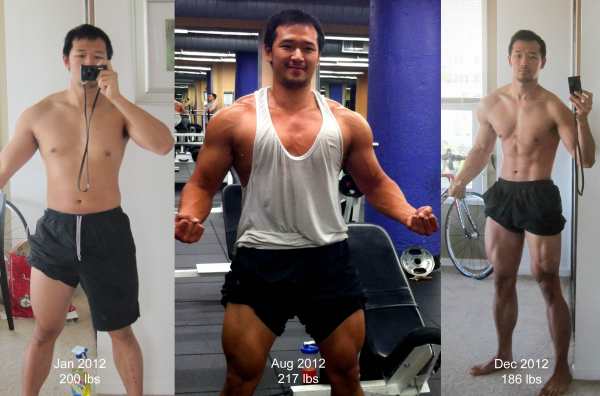




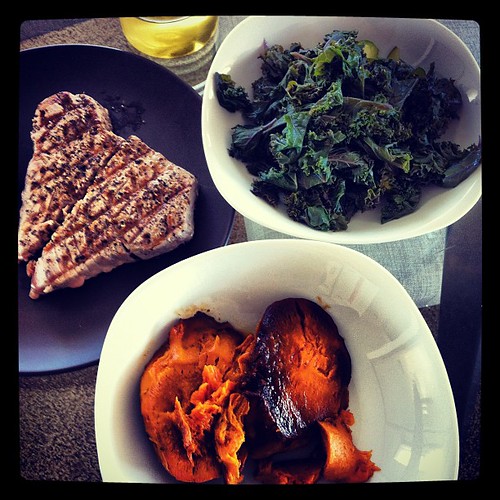

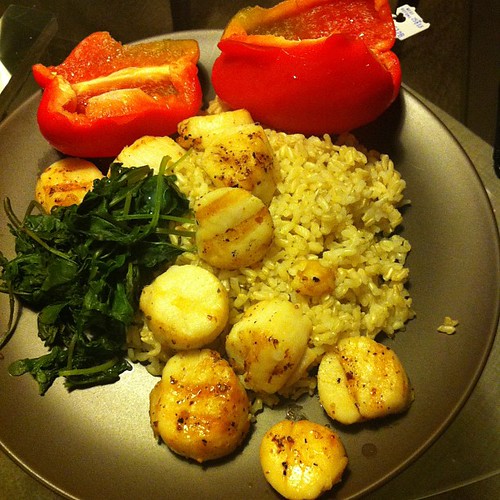


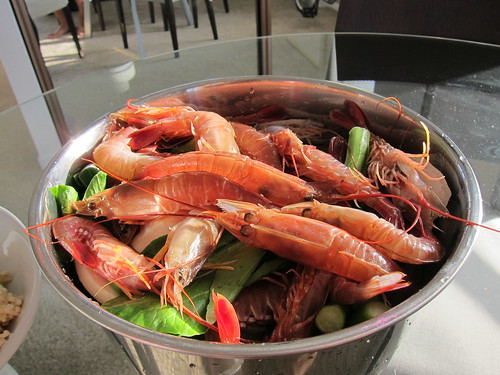





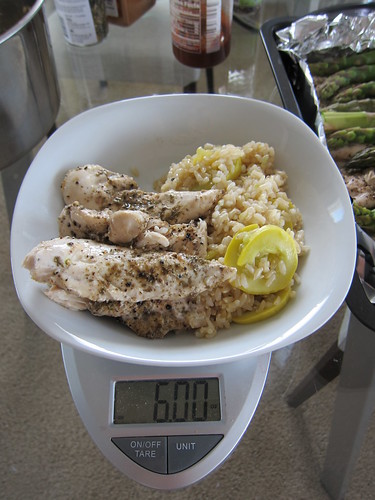
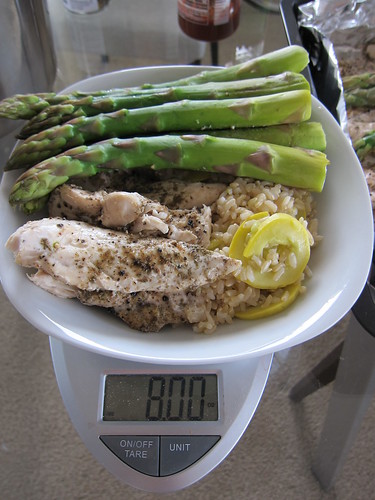







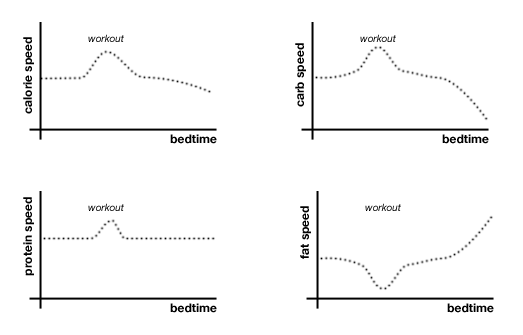








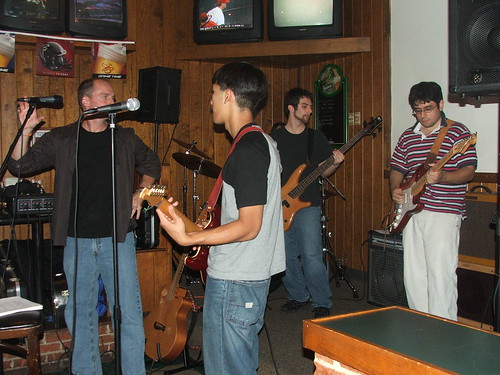

Hi Jason. Let me begin by saying how much I’ve enjoyed reading this blog entry. It was well organized and informative. I actually just stopped at a coffee shop in town so I could put a meal plan together before going to the grocery store on my home, so it was a serendipitous Facebook moment. I really appreciate other people putting time and energy into informing everyone else on something they’re passionate about. I don’t have the luxury of time to pour my energy into all the things I enjoy, so thanks for sharing the “Cliff Notes”. :) We became Facebook friends back in 2008, but I believe we met through Armstrong in Savannah. I think it was via an overlapping circle of friends and we would run into each other at the gym from time to time. My parents were bodybuilders while I was growing up and owned (and started) a gym in my home town of Bristol, TN. So the basics of brown rice, chicken, and a vegetable were regular staples on our dinner table. Growing up in that environment where a Power Bar was considered a snack and frozen yogurt was one of the few dessert items to grace our freezer I’ve had my moments of caloric rebellion. My workout regimen has fluctuated quite a bit over the past 15 years, as well. In the Army, during my most active weight lifting phase and highest body weight, I lifted weights 5-6 times a week and ate 4 times a day. I didn’t really concern myself with what I ate though. I had the basic knowledge due to my childhood, but loved sweets, pastas, and breads and sacrificed the abdominal six-pack for a twelve-pack in my fridge. We all know there is quite a difference in knowing the right things to do and actually doing them. Later in college, I discovered yoga, tofu, and hippie chicks. I also started rebelling from my weight lifting up-bringing adopting a more holistic view of health. This was also spurred on by my Dad’s double blood-pressure medication. He was a red meat and potatoes type of guy which began later in life and many years after competition ceased. Since I introduced vegetables and some vegetarian meals to his life, he’s down to 1 blood pressure med every other day or so. Now, I’m a grad student and my schedule doesn’t really allow me to have a regular workout schedule. But fitness is at my very core, nonetheless. I’ve experimented with home workout videos for the times I can’t get to the gym and given up my aspirations of having the bulk and leanness of a bodybuilder for the time being. But I haven’t given up on doing what I can when I can. And this blog has reinvigorated some of my excitement. I’ve always enjoyed the craft of sculpting my body and think the benefits of the discipline needed to workout and eat healthily extend far beyond the realm of fitness. Anyway, this is far longer than a “comment”, but I wanted to publicly extend my thanks for the time and knowledge you’ve shared. Keep it up!
No matter how many times I read this post, it still amazes and inspires me. I love it all. Thanks Jasone!
Hello Jason.
Let me tell you EXCELLENT blog im gonna share this around! I was very happy to read this, which is
saying a lot for me i usually dont take the time to read anything, but this was something very different!
I have learnt a lot from this.
Take care!.
Thank you for this blog. You most definitely have done a great job explaining everything. I just wanted to say this is very well written and informational. It was hilarious when you said your gf wanted you to watch less testosterone and more Notebook-type stuff, LOL! I’m going to take your advice, even though all I want to do is lose weight and not necessarily gain muscle. Thank you for posting. This is a great blog!
great read and info,cheers jason
Good advice my friend
lots of good information ! God bless you brah
Awesome work
What a great resource! I’m sure you know there are many hucksters on the Internet who sell “get ripped” programs with far less practical information for $$$$$.
One question though: I see that you seem to have put all of the food which you cooked on the weekend in your fridge. Does it all keep for a week in there or do you also freeze some of it? I ask this probably silly question because I have minimal cooking skills and even less knowledge about food storage and safety. So while I could probably outsource the food preparation I’d like to know how to preserve that investment and to consume the results without getting sick.
Thanks again for the outstanding post!
This is awesome, inspirational, informative, & action provoking.
Great read! I stumbled across this while searching for some tuna and kale recipes.
Hello Jason,
Let me just congratulate you on an amazing and well put together post. It is clear and concise and recommended for any beginner as the foundation knoledge to bodybuilding nutrition.
I have done bodybuilding before but this has inspired me and i have based my nutrition goals on your information here. One of the best things about it is the simplicity and availablity of the foods. I also started steaming and its amazing.
I have one issue though. I switched to brown rice, whole wheat and oats and i swear, it worked fantastically. I lost excess weight/fat and have been locked at my ‘natural’ weight, this is without any excercise. I don’t bloat as badly, or get constipated and my stomach is flatter, i can see some abs for the first time in 8 years.
This is great except i have discovered an issue with grains, certain beans and nuts – Phytic acid.
Studies have shown that Phytic acid inhibits mineral absorption such as Calcium, Iron, Zinc, Magnesium, etc. Not only essential for general health but highly important for bodybuilding.
I have begun doing research and finding ways to counter the issues of high Phytic acid consumption, but its not an easy thing to deal with, without heavily increasing mineral intake from food (not supplements). I might aswell mentions Oxalates which are also abundant in the food we eat which have a mineral absorption effect.
Do you have any knoledge on Phytic acid or would be willing to look into the matter ? I am just curious on your opinion really.
Best regards,
Mark.
Thank you very much for this article, I have never read anything like it before. You have inspired me to keep on going with my dream!
I’ve spent a long time researching different meal plans and diets, and this is by far one of the best articles I have read. Thank you so much for sharing this information with people like me that are serious about getting in shape the right way. Truly an inspiration.
Thank you for this blog post. You are amazing. What a journey. I did the same thing when I started lifting weights. I was a newly divorced, almost 40 yr. old female and I ate exactly as you describe and learned how to lift weights properly; timing, intensity, etc. and I grew enormously. And that was 20 years ago. Don’t worry ladies. You don’t have to grow. Just don’t eat so much food but keep it simple and the same type of food plan as Jason. Thanks for keepin it real. Bravo, Jason!
What an awesome article to stumble across on! Enjoyed every bit of the read! Thank you so much for sharing your wealth of knowledge!
just got bad news on my cholesterol and found this trying to opt out of meds, thank you for all this great info!!!
Jason, first thank you for this amazing post. I’m on my second read and, saving the photos and researching the spreadsheet — about to go to the grocery store, I’m psyched!
I have a colleague at work who is going through a very similar process as you and it’s been inspiring to all of us at work to see him drop weight but also be an inspiration to all of us to consider our health is an important part of living and working so hard. We are in the tech industry and sit at desks and many of my co-workers including myself could stand to lose some weight, it’s just the nature of the way we live our lives. I had a conversation with my colleague about two months ago and everything you so amazingly explain in detail is what he is basically doing. I found your post and i intend to use this as a guide as I’ve been searching for sometime for something like this, like you said it can just be overwhelming.
I’ve made some significant changes to my diet the past couple weeks and also have been diligent in the gym, though I’m not looking to increase mass so much as get cut and lose 10-15 pounds. I also play Ice hockey twice a week in an adult leage so my workout is tailored towards stamina and lower body strength. I’m also getting up in age (43 in a month) so the increase in activity coupled with a change in diet have at times taken a toll on my energy. I’m going to try your suggestions here to help with that and I’m sure they will.
Thank you so much for this comprehensive explanation of what is a complicated system to understand. You look so happy and healthy and congrats on lowering your cholesterol.
Regards, Jason
Thank you so much for sharing so freely. Very good, solid info. Best of luck in all your future endeavors!
Finally!! something good and easy to read.
You could do some excises or meal plan videos.. I would follow it and I am sure others would too.
Nice one
Great info Jason
Why does everything have to be about “FAT LOSS” Yaaawwn. Nice photo’s by the way, but you look Bigger in August 2012, than you do in December 2012, looks like you’ve lost way to much weight in those few months,
Great progress! I’m also Asian, except I’m coming from the opposite spectrum. My major is IT with a concentration in Networking. I’ve been a fattie my entire life (heaviest: 280 lbs with 35% bodyfat). I had to adjust my eating frequency and food type according to my bodytype, which was endomorph. I tried the eating 8 times a day and working out 6 days a week, but I only got fatter because I had metabolic syndrome and was insulin resistant. I now eat once a day and I eat a high fat and low carb diet, the ketogenic diet. I went from 280 lbs with 35% bodyfat down to 190 lbs and 9.5% bodyfat. I also integrated intermittent fasting, which forces my body to create hgh. I’m currently at 218 lbs with 13.7% bodyfat. I don’t spend more than 45 minutes in the gym and I only do 3 compound movement workouts twice a week (Monday and Friday) and my workouts are all 5×5 hypertrophy workouts. I can can curl and shoulder press 65 pound dumbbells so far, so I think that’s a new record. I couldn’t do that before, even at my heavier 280 lb weight. Anyways, great article!
I know this is old… but I’m glad I found it! I will starting my leaning out this week! this helped out a lot! Thank you, Mahalo!
Hi Jason,
Let me start off by saying that this is the best blog I have ever read thus far. I don’t think you could have explained this any better. Thanks for this man!
Great post with great info. Esp enjoyed the pics: of the meals & your transitioning. Truly helpful & inspiring to do & be better. Thanks for sharing!
this is seriously one of the dopest posts I’ve read about working out/weight gain. thanks for some of the detailed/informative pointers!
You eat very well. I eat this way accept due to age my prostate is swollen and a lot of foods make it worse. The experts say not to eat meat. I eat soy, but some people say this is not good. Young people have any easier time with bulking up, due to natural testosterone levels; but older guys got the problem have less to work with, keep up the good work
hey thank you for this.
im inversed from you though im really fat trying to lose weight and gain bulk :D
Hey” Jason, ” One of the most informative and beneficial blogs out there, Thanks!
Really enjoyed this read. I’m just getting over both shoulder surgery, a back injury and a small bout of cancer. Time to get back at it. This entry is helping me get my shit straight. Thanks dude.
Wow thanks! I’ve been looking for the skinny on body building fitness basics! No pun intended. Anyway Thanks! I was wondering if the 40/40/20 ratios are the same for a women losing weight? Not gaining weight for muscle. Thanks again!
Oh … How does fruit fit into your diet?
Best blog I’ve read. Loved the details and I feel really good about using some of this information for my own diet plan. Thank you.
thank you so much for creating such a clear, interesting and detailed account of your journey. this is EXACTLY was I was hoping to find as I journey from an all yoga and vegetarian lifestyle into lean proteins and weights. I was wondering if your lady was on this journey with you and if she has any specifically female pointrers on portion size and supplementation. thank you again! ciao <3
This is awesome. Your post will save a lot of people time in researching other posts. You have summed up many sources I have come across in researching this. Thank you!! Very inspiring!!!
The best bodybuilding article I’ve ever read. And I’ve read a LOT of articles.
Great going. You have put into words what I am doing now as well… I started opposite; 315+ pouds 30%+ body fat; lost 40 pounds so far and eating 1800 to 2000 calories while burning 5000 lifting weights 5 days a week… goal is to get to 200# of ripped/cut muscle. Enjoyed reading this, hope you are still at it!
This program summary is absolutely spectacular. I like to read what people are doing in my free time and I have to say this is one of the most well-thought-out and simple plans I’ve seen. I’ve been involved in the body building Community for almost 10 years, and everyone is looking for something just like this to get them started. I would absolutely recommend your post to anybody asking me for help. Great job.
this is an excellent example for health eating!! – 13kg/ in two weeks
thanks so much
I’ve probably read this 3x and enjoyed reading it every single time. There’s just so much honest info. Definitely saving this page for reference!
Thank you!
Amazing read, it’s helped me so much today!! My journey has been up and down as far as nutrition and weight loss but this has answered quite a few questions I had about my meal prepping and planning. Thoroughly appreciate all of the intricate details and science! Thanks!!
Very good article!
Mate, this was as awesome read.
I just fell upon it searching for bodybuilding diet info – so thank you!
That was very informative and helpful. Thanks!
Tilapia is one of the worst things you can put in your body, it causes inflammation and can be bad for your heart from harmful omega 6 fatty acids among other things, plus most farmers feed them crap, yuck! unless its wild caught…even then I avoid it. I do agree with the chicken, oatmeal, fish (wild alaskan salmon, tuna, etc.), rice, fresh vegetables and fruit diet though.
This was exactly what I needed to get back into the gym and start smashing out some PR’s again. Thank you so much for this.
i just had to say this is a brilliant source of information also your an amazing writer.
Thank you for all the information.
This is like a Mythbuster to me. It is difficult to find someone that start a workout program thinking first in beeing healthier.
Definately, this will be my guide for a long time from now.
Regards!!
Hi! Love this post. I just happened to come across it while I was searching for ways to prepare fish on Sunday to eat throughout the week. Everyone suggests making a soup/tacos…out of “leftover” fish but I want to eat it as usual with a carb and veg. I can only shop on Sunday so I can’t buy fish and eat it in the same day (except Sunday). If anyone has suggestions, I would appreciate it. I don’t eat Tilapia. That’s the only one I won’t eat. I’ve book marked this page because it’s very motivating and want to read it again. Thank you!
Thank you! This is such a great resource!
Excellent read. Thanks so much! Best info on nutrition I’ve found in a single place, with great examples. Thanks!!
I owe you been doing this five years, and now here we are with how its properly done….your a badass…